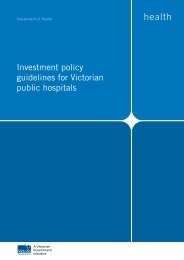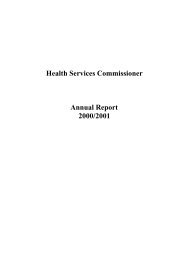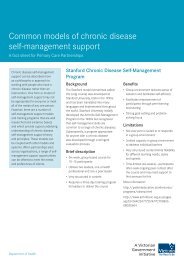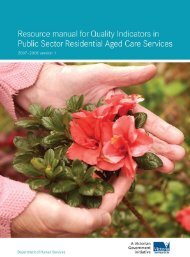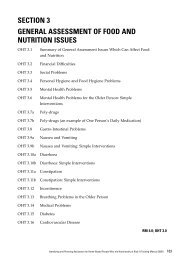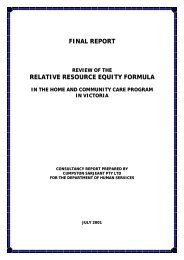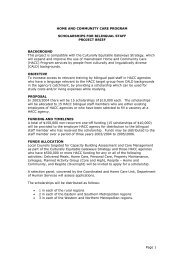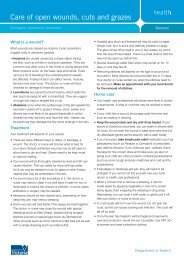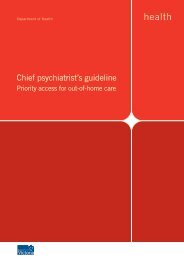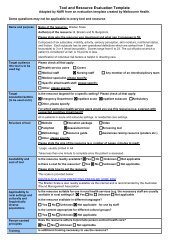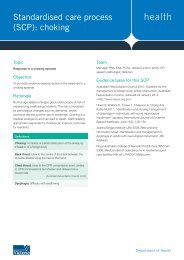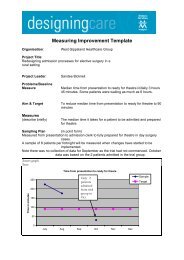Primary Health Branch policy and funding guidelines
Primary Health Branch policy and funding guidelines
Primary Health Branch policy and funding guidelines
Create successful ePaper yourself
Turn your PDF publications into a flip-book with our unique Google optimized e-Paper software.
<strong>Primary</strong> <strong>Health</strong> <strong>Branch</strong> <strong>policy</strong> <strong>and</strong> <strong>funding</strong> <strong>guidelines</strong>––2006–07 to 2008–09 (2008–09 update) 9<br />
Reporting to the community on quality of care<br />
<strong>Health</strong> services, including independent community health<br />
services, are required to publish an annual Quality of Care<br />
Report. The extension of this requirement to independent<br />
community health services was flagged in the previous Policy<br />
<strong>and</strong> <strong>funding</strong> <strong>guidelines</strong> (2007). An option to submit the<br />
Quality of Care Report for an award is now available to<br />
independent community health services.<br />
The May 2008 Clinical Governance in Community <strong>Health</strong><br />
Forum included presentations to assist agencies in the<br />
development of the Quality of Care Report. Further<br />
information, <strong>guidelines</strong>, timelines <strong>and</strong> resources are available<br />
at .<br />
Complaints management<br />
Complaints <strong>and</strong> other comments from clients are an<br />
important tool for quality improvement <strong>and</strong> risk management.<br />
Agencies are expected to show evidence of comprehensive<br />
<strong>policy</strong> <strong>and</strong> practices for complaints management.<br />
Changes to complaints management systems are flagged in<br />
the section below on Critical incidents.<br />
Cultural <strong>and</strong> linguistic diversity<br />
The <strong>Primary</strong> <strong>Health</strong> <strong>Branch</strong> <strong>and</strong> the department recognise<br />
the importance of ensuring that Victorians of culturally <strong>and</strong><br />
linguistically diverse (CALD) backgrounds have full <strong>and</strong> fair<br />
access to services. Improving access <strong>and</strong> ensuring<br />
appropriate care are important challenges for the sector.<br />
Training for staff wanting to improve skills <strong>and</strong> underst<strong>and</strong>ing<br />
of working with CALD populations is available through the<br />
Centre for Culture, Ethnicity <strong>and</strong> <strong>Health</strong> (www.ceh.org.au/).<br />
All agencies are expected to be familiar with the Victorian<br />
Government’s language services <strong>policy</strong>, Improving the use of<br />
translating <strong>and</strong> interpreting services: a guide to Victorian<br />
Government <strong>policy</strong> <strong>and</strong> procedure. The guide stipulates the<br />
minimum government <strong>guidelines</strong> for the provision of<br />
interpreting <strong>and</strong> translating services. The guide can be found<br />
on the Victorian Multicultural Commission website<br />
(http://www.multicultural.vic.gov.au/).<br />
Clinical governance<br />
To strengthen the quality <strong>and</strong> safety of services <strong>and</strong><br />
programs in primary health, a three-year project is well<br />
advanced to implement a clinical governance framework <strong>and</strong><br />
associated practices in community health services. The work<br />
is being jointly undertaken by the Victorian <strong>Health</strong>care<br />
Association (VHA), accrediting organisations (Quality<br />
Improvement Council (QIC) <strong>and</strong> Australian Council on<br />
<strong>Health</strong>care St<strong>and</strong>ards (ACHS), community health services<br />
(independent <strong>and</strong> integrated), Dental <strong>Health</strong> Services Victoria<br />
(DHSV), the Victorian Managed Insurance Authority (VMIA)<br />
<strong>and</strong> the <strong>Primary</strong> <strong>Health</strong> <strong>Branch</strong>.<br />
All projects listed in the previous <strong>policy</strong> <strong>and</strong> <strong>funding</strong><br />
<strong>guidelines</strong> (2007 update) have been completed. Project<br />
reports <strong>and</strong> resources are available on the VHA website<br />
.<br />
Work throughout 2008 <strong>and</strong> 2009 will focus on consolidating<br />
practices <strong>and</strong> supporting agencies to develop programs that<br />
contribute to a more effective workforce <strong>and</strong> strengthen the<br />
quality <strong>and</strong> safety of services. Major initiatives include:<br />
• statewide training for agency staff in clinical risk<br />
management––a partnership with VMIA<br />
• project on clinical leadership <strong>and</strong> supervision (research<br />
<strong>and</strong> implementation)<br />
• project on implementing scope of practice in an agency<br />
(independent living services, intake services,<br />
interdisciplinary services <strong>and</strong> counselling)<br />
• education of clinical staff<br />
• launch by DHSV of the Oral <strong>Health</strong> Quality Framework<br />
• trial of QIC Clinical Governance Audit Tool<br />
• development of community health clinical indicators.<br />
Community health services are invited to share their work on<br />
clinical governance through the project at VHA. Agencies<br />
that have yet to develop frameworks <strong>and</strong> supporting<br />
activities for clinical governance are encouraged to<br />
participate <strong>and</strong> to keep up to date through the VHA website<br />
. From 1 July 2009, agencies will be<br />
expected to have fully implemented clinical governance at all<br />
levels of their organisation.<br />
The following sections outline further initiatives to strengthen<br />
clinical governance.



